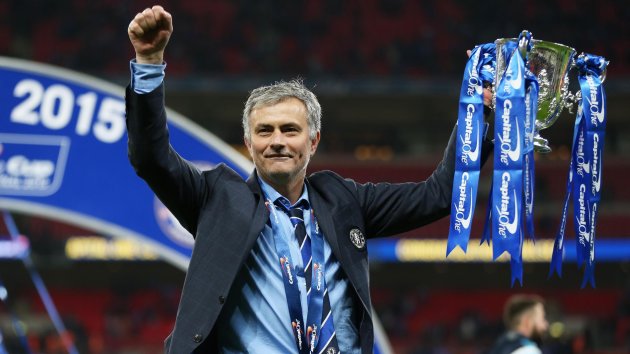
Ben Lyttleton examines whether claims that Chelsea's League Cup win will inspire them to greater feats is backed up in reality.
Now Chelsea have won the Capital One Cup, you can expect them to go on and win the Premier League and almost certainly be England’s last team standing in the Champions League. One word you are certain to hear in the aftermath of the Blues’ 2-0 win over Spurs at Wembley in the Capital One Cup final is ‘springboard’. The perceived wisdow will have you believe that: “This can be a real springboard to success for the rest of the season.”
Let’s consider Chelsea’s position in the Premier League: after Liverpool did them a huge favour on Sunday by beating Manchester City, Jose Mourinho’s side are now five points clear with a game in hand and only 12 games left to play. So even if they had lost the cup final to Spurs, you’d still expect them to win the league.
But, I hear you cry, what about Chelsea back in 2005 at the start of the first Mourinho era? Back then, Chelsea hadn’t begun their cycle of success, and the 3-2 League Cup final win over Liverpool really was ‘the springboard to success'.
This is what John Terry said about that game: “It was the first one for the team, which made a big impact through all the squad. It set us on our way. It gave us a taste of what we wanted – more. I think it brought the squad closer together. Like everyone, I felt something different when the manager came in [in 2004]. It was a different mentality, everything was about winning. That rippled through the whole squad, through the academy, through the whole club, and he has continued that. He has brought that back again. A lot of people write this competition off but for me it is huge and we look back on that 2004-05 season, it had a huge impact on our confidence and momentum.”
This is the perfect Mourinho narrative: it’s impossible to know if beating Liverpool had more impact on their momentum than the fact that when they won that final, Chelsea were already nine points clear of Manchester United at the top of the table (with 11 games left). But it works: winning is a habit that Mourinho needed to teach his players back then, and in his second spell at the club, and after two years without a trophy for himself, the same is true now.
Brian Clough understood as well, and always claimed that Nottingham Forest’s 1977 Anglo-Scottish Cup final win over Leyton Orient (5-1 on aggregate) was crucial to the European Cup final success of 1979 and beyond. Eight of the players who were in the 1979 final all played some part in the Anglo-Scottish final, and Clough was adamant that experience helped. As he put it: “Our lot tasted champagne and found that they liked it.”
That could be why Chelsea celebrated with such wild abandon after the Spurs game. If the sight of Didier Drogba leading the celebrations seemed strange, it was because for many of the players in the squad, this was their first trophy success with Chelsea, rather than just the latest in an extensive collection. It’s also why Mourinho encouraged the fringe players in the squad to lift the trophy during the ceremony rather than just pass it down the line.
Does the ‘springboard to success’ line work for other teams? Is the League Cup final important in the winning development of previous trophy victors? While we can determine a correlation between winning the League Cup and future trophies (Chelsea won in 2005, then won back-to-back league titles), it’s impossible to prove causation: did they win the league BECAUSE they won the League Cup? (Almost certainly not given the unassailable lead they had garnered by then.)
You can divide the League Cup winners this century into two distinct groups: those who were already in a successful period (that includes being top of the league at the time of the final) and those for whom the cup success was something of a one-off.
So perhaps there is another way to look at it: if winning the League Cup provides a team with a post-title bounce, then their points total will increase in the following season.
Out of the last 15 winners, seven were already successful and eight were one-off winners. Also, seven did worse the following season, and eight did better. While Chelsea in 2005 were seen as the archetypal ‘springboard to success’ team, and they did go on and win the title in 2006 as well, they actually won four fewer points the next season.
The winner after Chelsea 2005 provided the most authentic post-League Cup bounce: that was Manchester United, who were graded as one-off winners, perhaps harshly, but were in a slump in the shadow of Mourinho. United had not won a league title since 2003 and an FA Cup since 2004. Two years lagging behind before the 2006 League Cup final, and then a bounce of six more points the following season, which saw them win the Premier League... by six points.
The general pattern is that the bounce does happen for the one-off winners, with Blackburn 2002 the best example of this: they finished 10th on 46 points in 2001-02, and the following season, sixth with 60 points.
All of which means that while Chelsea’s winning habit might catch on for the rest of the season and beyond, there is a sense that the bounce from winning the trophy would have been more apparent if their opponents on Sunday, Spurs, had lifted the trophy.



0 comments:
Post a Comment